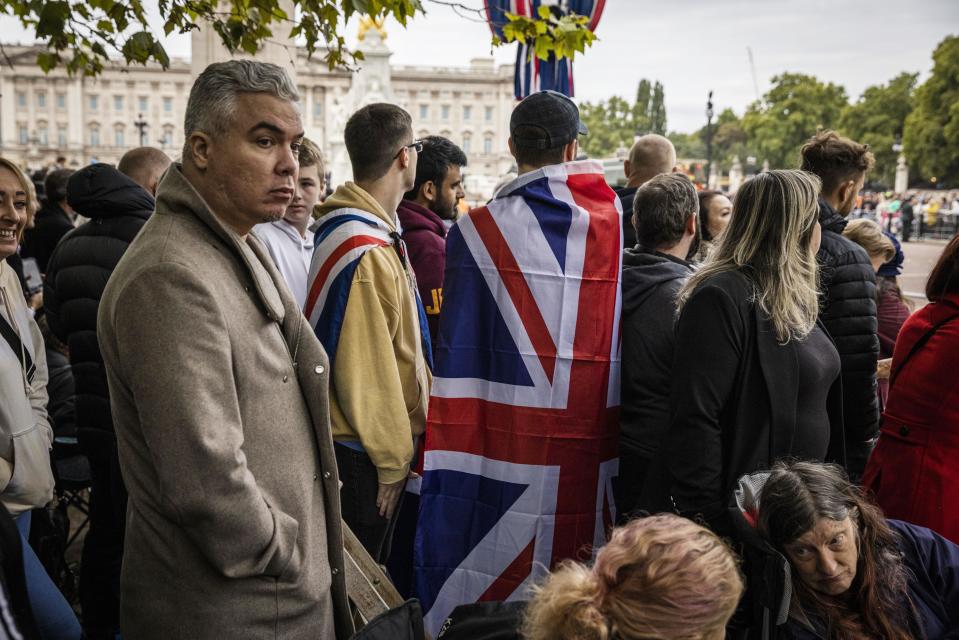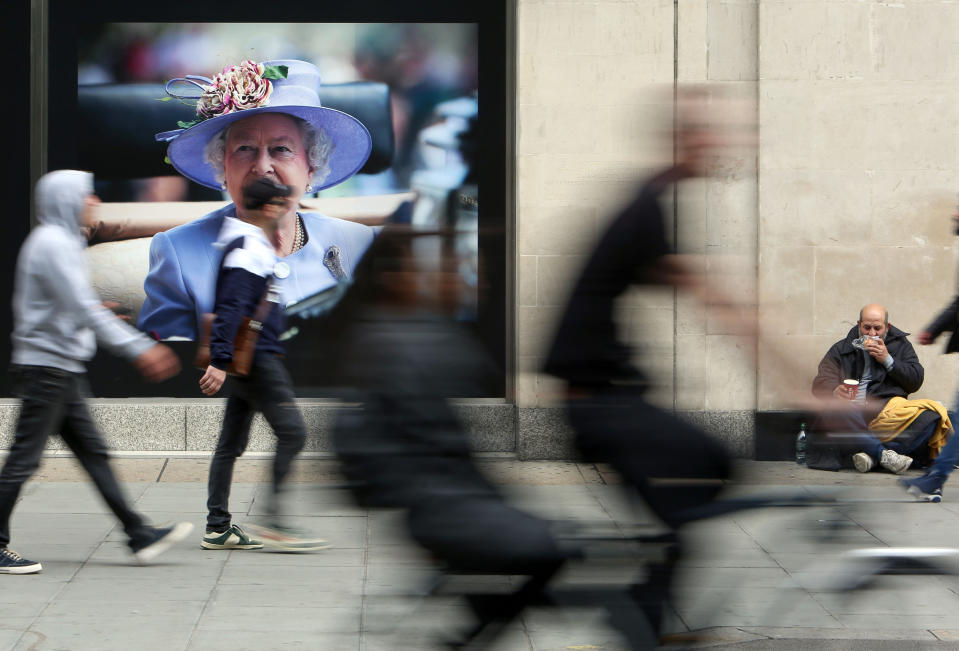After Queen Elizabeth's funeral, Britain wakes to economic challenges
- Oops!Something went wrong.Please try again later.
- Oops!Something went wrong.Please try again later.
LONDON — Even for a country that prides itself on pageantry, it was an occasion of majestic splendor.
Yet, the ceremony and solemnity of the state funeral are already giving way to an unavoidable realization: The grandeur that marked Queen Elizabeth II's funeral and was seen by billions across the world is not the reality of the country that most woke up to last Tuesday.
Britain is facing myriad crises, from spiraling costs for food and fuel to an energy crunch that could cause blackouts this winter.
And while they may have been eclipsed by the sheer emotion of the queen's final farewell — which brought much of the country to a standstill and saw large crowds line the capital's streets for days — those challenges have not gone away.
With the world leaders headed home, the uniforms hung back in the closet, and the flags returned to full staff, Britain’s problems will now come roaring back into focus.
“This has been 10 days of Britain being in suspended animation,” said Scott Lucas, a professor of American studies at England’s University of Birmingham who specializes in British and American politics. “The Brits are going to get an immediate shock and an immediate dose of reality.”

As thousands of military personnel from Britain, Canada, New Zealand and Nepal marched in lockstep up Whitehall last Monday, it was an echo of the country's colonial past. But it was also easy to imagine that marching away with them, and the coffin they were escorting, were some of the final threads to the United Kingdom's status as a top-tier global power.
While the second Elizabethan age saw the collapse of the British Empire, the queen also served as a living bridge to that era and worked to retain some of the nation's influence overseas through the Commonwealth.
Now, that legacy looks more uncertain than ever.
Prime Minister Liz Truss, appointed by the queen days before the monarch's death, landed in the United States on Sept. 20 ahead of her first official meeting with President Joe Biden. However, she admitted to journalists even before they'd spoken that a U.S.-U.K. trade deal — once seen as the grand prize by Brexit supporters — was unlikely "in the short to medium term."
Truss' new Conservative administration is untested and unpopular, according to opinion polls. She leads a Britain still finding its place in the world after turning its back on its largest trading partner, the European Union. Yet, she will do well to merely hold the U.K. together at all, with supporters of Scottish independence and Irish reunification hoping for new impetus in the absence of the queen's often unifying presence.
At home, a winter cost-of-living crisis and an energy crisis are already biting for many households and small businesses, with prices for food and fuel spiraling in part due to Russia’s invasion of Ukraine. The summer saw hundreds of thousands of workers go on strike in a mood of general unrest.
The road ahead looks no less rocky. Inflation might get close to 20% in January, economists from Goldman Sachs and Citi have warned. (It is currently 8.3% in the United States.)
Britain must confront these challenges after laying to rest its era-defining figurehead, a monarch who spanned generations and ideologies.

The queen's ubiquitous celebrity helped Britain to punch above its shrinking economic and political weight on the global stage.
Outside Westminster Abbey last Monday, that legacy was palpable.
“It makes you so proud to be British,” said Lorna Deller, 28, a dental nurse from Norfolk, east of London. Seeing the queen lying in state and attending the funeral were "the two most impactful moments of our lives,” added her mom, Judy Bunning, 54, a beauty therapist. “Whenever I think about it, I just start crying.”
It's not just Britons who said their terrestrial worries had been temporarily eclipsed by the emotion of the queen's death.
Angel Lee, 51, moved to Britain from Hong Kong two years ago, as the Chinese government tightened its grip on the former British colony. She was one of the 250,000 people who lined up for hours to see the queen lying in state, according to U.K. Culture Secretary Michelle Donelan. When Lee saw the coffin being taken through the streets last Monday, she cried so much that she found it hard to speak.
"To me, she represented freedom of expression," said Lee, who arrived Sunday — and slept on the sidewalk — to save a spot with her son, Abraham Nip, 13. "Even though the queen was the head of state, she didn't act as though she was above anyone else."
Not everyone agrees with that view, of course, with the queen’s death prompting many across the Commonwealth and beyond to call out the royals’ role in Britain’s history of violent colonialism. Some inside the country itself used the event to call for reforms or even replacement of the unelected head of state.
King Charles III's reign may intensify those voices, and it's far from clear he will have anything like the same domestic emotional appeal or international clout as his mother.

Despite many countries colonized by the British Empire slowly liberating themselves during Elizabeth's reign, the late queen became emblematic of the cozy brand of soft power that replaced it in the eyes of some across the world: Beefeaters, Paddington Bear and of course the national pastime of 'queuing' that has dominated the past week here.
Britain will now jolt from that cuddly self-image back into the harsh realities of its current predicament.
"This is not a right versus left thing, this is not Conservative versus Labour, this is about people trying to make ends meet," said Lucas at the University of Birmingham, referring to the country's two main political parties. He believes this winter "will be the biggest economic and social crisis, definitely since the 1980s, and probably since the 1970s."
The last time Britain stared down a challenge of this magnitude, in the early pandemic days of spring 2020, the queen delivered a rare TV address.
"Better days will return," the monarch told an audience of 23 million, channeling the famous words of wartime singer Vera Lynn to reassure the nation that "we will meet again."
As it confronts its many challenges, the country will this time be without its familiar presence in the palace.
This article was originally published on NBCNews.com

